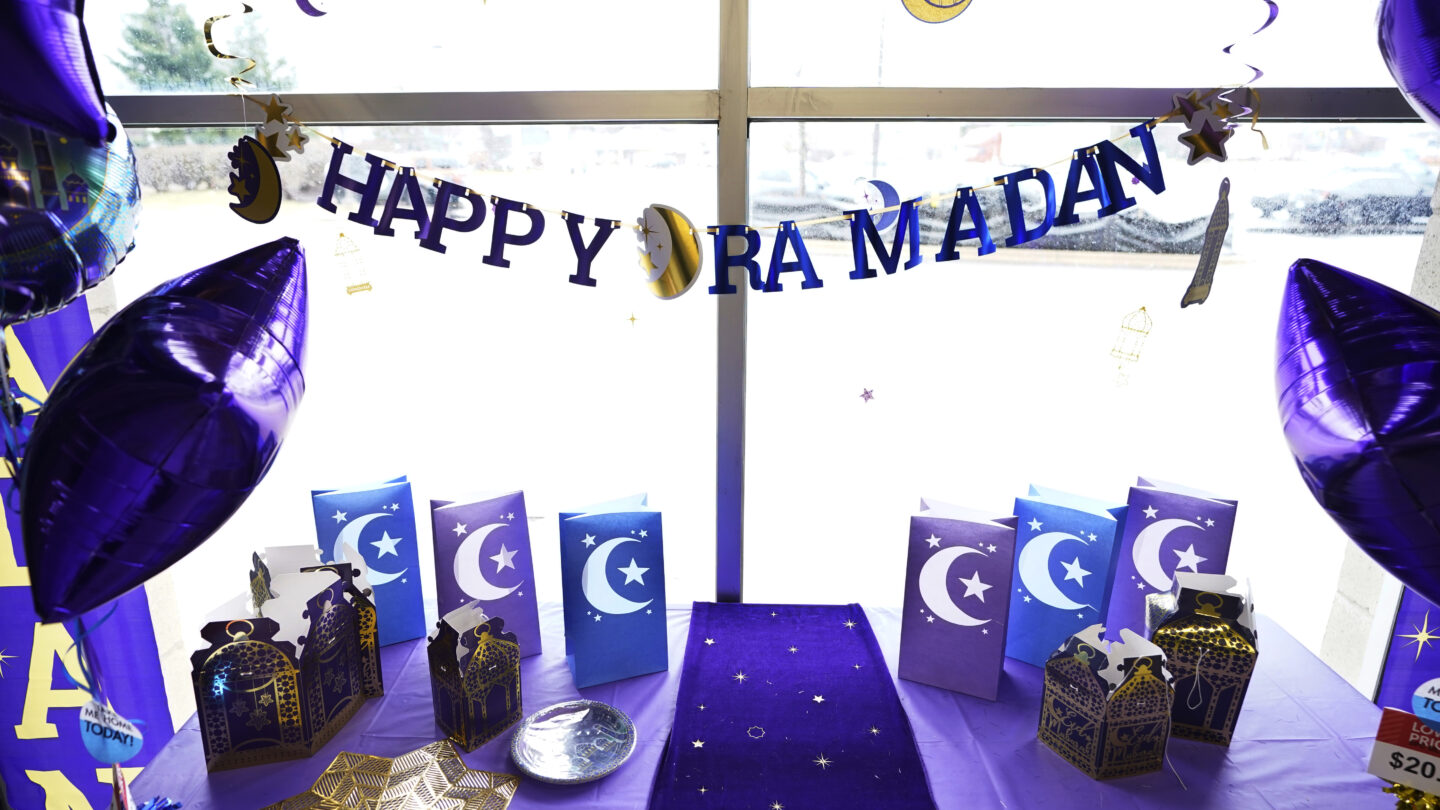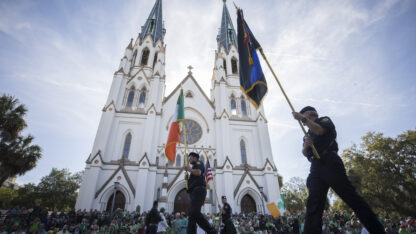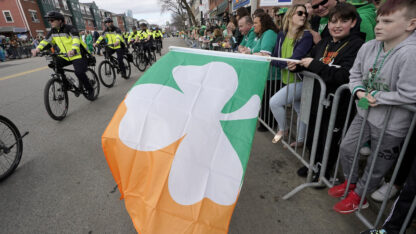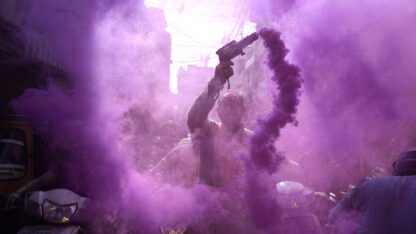With her 3-year-old daughter sitting inside a red Target shopping cart, Aya Khalil looked through the aisles with anticipation. The author was on a mission: See for herself that her children’s book about a boy and his grandmother baking for an Islamic feast was actually carried by her local Target store in Toledo.
“Oh my God! … It’s right there,” Khalil said on spotting “The Night Before Eid.”
“Oh yeaaaaah!” her daughter joyously exclaimed. Khalil giggled.
For Khalil, it was a pinch-me moment as an author — and also a big deal as a mother.
“This didn’t happen when I was growing up. It was like, ‘Are things really changing now?’” she said. “I’m just really happy that now my own kids will be able to see that and that they’ll know that their stories are valid and … are out there like a totally normal thing.”
For this year’s Muslim holy month of Ramadan, which started last week, Target rolled out its first dedicated Ramadan and Eid collection, including decoration kits with crescent and lantern-shaped cutouts. It’s one of the latest signs of big retailers in the United States catering to Muslim shoppers’ needs.
Many Muslim Americans enthusiastically welcomed the recognition, applauding retailers that are making it easier for them to bring their families the cheer that ubiquitously and publicly marks some other faiths’ holidays.
“As stores have accommodated for Easter and Christmas for centuries, I’m glad to see them bring in Ramadan items,” said Hass Beydoun of Dearborn Heights, Michigan. “We welcome it, because they are welcoming our culture and beliefs in their stores.”
Others echoed the sentiment on Target’s website: “Thank you so much for making Ramadan decor mainstream,” one shopper wrote. “We feel seen and heard!” wrote another.
Still, some have been debating the merits of buying Ramadan decor from big box retailers in America, where Muslims make up a small but growing part of the population, to encourage representation, versus supporting small, Muslim-owned businesses that have made such items. Some others caution against excessively commercializing a religious period.
Ramadan is a month of fasting, increased worship and charity. It’s often a time for festive gatherings; on social media, some share photos of their decorated homes or swap ideas for DIY Ramadan decor and children’s activities. Ramadan is followed by the Eid al-Fitr holiday.
Target’s new Ramadan and Eid collection is sold online and in a few hundred stores in areas with numerous Muslim shoppers. The retailer, which didn’t provide sales figures, said it received positive feedback from shoppers and that the collection is part of its commitment to diversity and inclusion.
Party supplies retailer Party City started selling Ramadan and Eid items in 2018 and has since increased such products amid growing demand. More than 280 stores, particularly in locations with large Muslim populations, carry the items, which include lantern string lights and table runners reading “Ramadan Mubarak,” or “Blessed Ramadan.”
“Our goal is to offer authentic and inclusive celebration options to all of our customers, particularly those who are underrepresented in the retail industry,” said Susan Sanderson, Party City’s senior vice president of brand marketing.
Walmart Inc., the nation’s largest retailer, said it recently started carrying items related to Ramadan and Eid but the merchandise is sold only online, not in stores.
Still, that’s a change from when Jomana Siddiqui received an Eid present in Christmas gift wrap in 2011; at the time, Siddiqui, whose business is based in Fullerton, California, said she didn’t see American retailers carrying merchandise for Ramadan or Eid. She tried to get malls and stores to put up signage acknowledging the Muslim holy days but was rebuffed.
From 2014 to 2016, she worked with Macy’s at South Coast Plaza mall in Costa Mesa, California, to design the display towers with “Happy Ramadan” signs for an event. In 2018, she started selling her own items at a pop-up shop at Macy’s in Westminster, California.
Even now, Siddiqui is struggling to convince major retailers to sell her modern-style items like “Ramadan Blessings” platters — and Ramadan and Eid-appropriate gift wrap sheets. She contends many retailers treat American Muslims, who are racially and culturally diverse, as a monolith and says they should avoid cultural stereotypes.
“Putting camels and palm trees on something doesn’t speak to Indonesian Muslims or a Mexican Muslim,” she said.
Fatima Siddiqui, who lives in the metro Detroit area and owns a calligraphy art business, wrote on Facebook that amid the excitement at retailers carrying Ramadan decorations, community members shouldn’t forget to support Muslim-owned small businesses.
Responses varied. Some shoppers said that while supporting such businesses is important, so is buying from the big, national ones to encourage more representation and for Muslim children to feel celebrated. Others argued that decorations offered by many of the small businesses were often expensive or that big retailers were more accessible. Others suggested buying from both.
“Why wouldn’t retailers partner up with small businesses to showcase their products that are handcrafted with thoughtful meanings?” said Fatima Siddiqui. This year, she organized a Ramadan market in Canton, Michigan, where vendors sold items including banners, wreaths and serving trays.
“Ramadan decor boosts our excitement and mood,” she said. “It helps our younger generation feel special because of the obvious displays of Christmas and other non-Islamic holidays.”
The decor can spark educational conversations with non-Muslims, said Yasmen Bagh, who lives in Jersey City and has founded a business selling outdoor inflatables in such shapes as mosques and lanterns.
“It brings awareness to your neighbors,” she said. “The images that they see on TV and what Muslims look like is usually like a bad guy; it’s changing that.”
Bagh is conflicted about big retailers stepping into the Ramadan and Eid space. “As a Muslim, it makes me happy; as a business owner, it makes me worry.”
Some other business owners say there’s room for everyone. And while some Muslims argue a focus on decor and other material items can distract from the month’s spiritual essence, others say a balance can be struck and that the products help children get engaged.
Mainstream retailers have gradually paid more attention to Muslim customers. Macy’s sells modest wear, including hijabs. Nike unveiled a hijab for Muslim female athletes in 2017, sparking mixed reactions and a discussion about inclusivity in sports. Other activewear brands followed with their own athletic hijabs. Since 2021, Mattel’s American Girl brand has been selling an Eid al-Fitr celebration outfit, which includes a long-sleeved turquoise abaya dress, for its 18-inch dolls.
The move to embrace Muslim shoppers is part of a broader strategy by retailers to better connect with increasingly diverse generations of customers. Some critics dismiss the effort as a marketing tactic to boost the bottom line.
Sabiha Ansari, co-founder and vice president at American Muslim Consumer Consortium, a nonprofit dedicated to developing the American Muslim consumer market, said she doesn’t mind whether the goal is to make a dollar. She’s just happy companies are embracing products catering to Muslims.
“People want to be recognized,” she said.
Back in Toledo, Khalil, the author, said her book is, first, for the Muslim children and, even adults, who haven’t seen themselves in books. It tells the story of Zain, who helps his grandmother who is visiting from Egypt, where Khalil was born, bake traditional cookies covered in powdered sugar for the feast. He shares the treats with his classmates, who love them.
For this Ramadan, Khalil spruced up her home with lights, lanterns and signs, mostly from small businesses. Her kids also painted a craft kit—that one was bought from Target.









